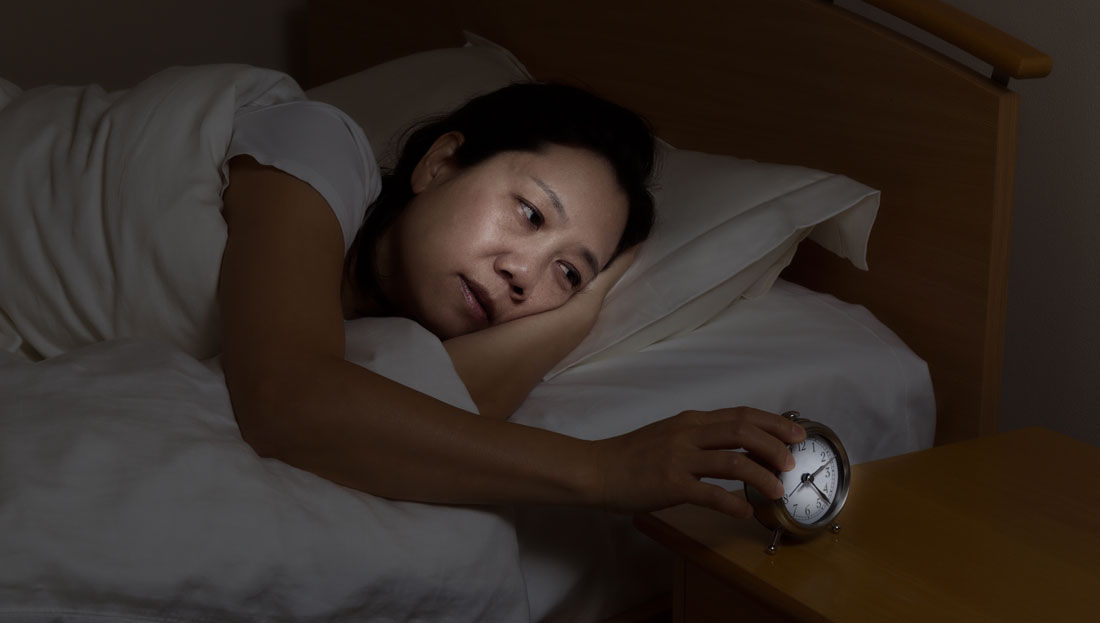
Study: Poor Sleep Linked to Increased Heart Disease in Women

Women who sleep poorly tend to overeat and consume a lower-quality diet, according to a new study from researchers at Columbia University Irving Medical Center. The findings provide new insight into how poor sleep quality can increase the risk of heart disease and obesity and points to possible interventions for improving women’s heart health.
Previous studies have shown that people who get less sleep are more likely to develop obesity, type 2 diabetes and heart disease—and that the relationship may be partially explained by diet. But these studies were narrowly focused on specific foods or nutrients (such as fish, sweets or saturated fat) or only measured sleep duration rather than sleep quality.
The new study, which was published online in the Journal of the American Heart Association, was designed to get a more comprehensive picture in women by examining associations between overall diet quality and multiple aspects of sleep quality.
“Women are particularly prone to sleep disturbances across the life span, because they often shoulder the responsibilities of caring for children and family and, later, because of menopausal hormones,” says Brooke Aggarwal, EdD, assistant professor of medical sciences at Columbia University Vagelos College of Physicians and Surgeons and senior author of the study.
The researchers analyzed the sleep and eating habits of an ethnically diverse group of 495 women, ages 20 to 76. The study looked specifically at sleep quality, the time it took to fall asleep and insomnia. The women also reported on the types and amounts of foods they typically eat throughout the year, allowing researchers to measure their typical dietary patterns.
The Sleep-Diet Connection
Similar to previous studies of sleep and diet, the study found that those with worse overall sleep quality consumed more of the added sugars associated with obesity and diabetes. Additionally, women who took longer to fall asleep had higher caloric intake and ate more food by weight. And women with more severe insomnia symptoms consumed more food by weight and fewer unsaturated fats than women with milder insomnia.
“Our interpretation is that women with poor-quality sleep could be overeating during subsequent meals and making more unhealthy food choices,” says Aggarwal.
The researchers are not yet certain exactly how poor sleep might contribute to poor eating, but they do have a theory.
“Poor sleep quality may lead to excessive food and calorie intake by stimulating hunger signals or suppressing signals of fullness,” says Faris Zuraikat, PhD, postdoctoral fellow at Columbia University Vagelos College of Physicians and Surgeons and lead author of the study. “Fullness is largely affected by the weight or volume of food consumed, and it could be that women with insomnia consume a greater amount of food in an effort to feel full.”
However, adds Zuraikat, “it’s also possible that poor diet has a negative impact on women’s sleep quality. Eating more could also cause gastrointestinal discomfort, for instance, making it harder to fall asleep or remain asleep.”
“Given that poor diet and overeating may lead to obesity—a well-established risk factor for heart disease—future studies should test whether therapies that improve sleep quality can promote cardiometabolic health in women,” says Aggarwal.
What the Research Means to Health and Exercise Professionals
While the focus of this research was the link between sleep and heart disease among women, sleep has been increasingly recognized as having a significant effect on overall health and well-being, for both men and women. As such, it is important to educate your clients about these links and offer recommendations for improving the quality of their sleep, such as reducing sugar intake (as noted in this study), improving sleep hygiene and reducing exposure to blue light.
Notably, previous research has shown that a variety of exercises can have a profound positive effect on sleep quality. Researchers at the Perelman School of Medicine at the University of Pennsylvania looked at whether specific types of physical activities may impact sleep quality. They found that walking, aerobics/calisthenics, biking, gardening, golf, running, resistance training and yoga/Pilates proved beneficial to enhancing sleep. However, they also concluded that some types of physical activity took a toll on the quality of one’s sleep. Specifically, household chores and childcare were associated with increased cases of poor sleep habits (a fact that will come as no surprise to parents of young children).
The researchers also concluded that, compared to those who reported that they did not get physical activity in the past month, all types of activity were associated with a lower likelihood of insufficient sleep (with the notable exceptions being household chores and childcare).
“Although previous research has shown that lack of exercise is associated with poor sleep, the results of this study were surprising,” says Michael Grandner, Ph.D., an instructor in psychiatry and lead author of the study. “Not only does this study show that those who get exercise simply by walking are more likely to have better sleep habits, but these effects are even stronger for more purposeful activities, such as running and yoga, and even gardening and golf.”
In other words, enjoyable, physically active pursuits are a great way to promote better sleep, an important piece of wisdom all health and exercise professionals should be sharing with their clients. And, given the apparent negative impact of housework and childcare, it might be worth discussing these challenges with clients who have families.
And while it may seem that the message to get more sleep is one we’ve all heard more times than we can count, it’s still worth reminding your clients about the huge role sleep plays in overall health and well-being, including mental and physical performance, weight maintenance, emotional health and risk of heart disease. After all, given the widespread prevalence of inadequate sleep among Americans, this is likely a message many of us need to hear more than once.

More Articles
- Certified™: April 2020
How You and Your Clients Can Avoid the Comparison Trap
Health and Fitness Expert
- Certified™: April 2020
ACE-SPONSORED RESEARCH: How Post-exercise Heating Strategies Affect Endurance Performance
Contributor
- Certified™: April 2020
Ask ACE: High-intensity Interval Training
Contributor
- Certified™: April 2020
How to Help Clients Overcome Emotional Eating
Health and Fitness Expert
- Certified™: April 2020
Hyper Rope: An ACE Integrated Fitness Training Model Workout
Health and Fitness Expert




 by
by 

